The field service of this engagement was anything but light work, much of it being performed in the depth of winter with a temperature fifty degrees below zero. The principal food of the party was tallow and some other substance, which was warmed over a fire on stopping at night. The snow was then removed to a sufficient depth for a bed, and the party wrapped one another up in their buffalo robes, until the last man’s turn came, when he had to wrap himself up the best he could. In the morning, after warming their food and eating, the remainder was allowed to harden in the pan, after which it was carried on the backs of men to the next stopping place. The work was all done upon snow-shoes, and occasionally a man became so blinded by the glare of the sun upon the snow that he had to be led by a rope.
Upon the 1st of June, 1821, Whistler was made second lieutenant in the First Artillery, in the reorganized army; on the 16th of August, 1821, he was transferred to the Second Artillery, and on the 16th of August, 1829, he was made first lieutenant. Although belonging to the artillery, he was assigned to topographical duty almost continually until December 31, 1833, when he resigned his position in the army. A large part of his time during this period was spent in making surveys, plans, and estimates for public works, not merely those needed by the national government, but others which were undertaken by chartered companies in different parts of the United States. There were at that time very few educated engineers in the country, besides the graduates of the Military Academy; and the army engineers were thus frequently applied for, and for several years government granted their services.
Prominent among the early works of internal improvement was the Baltimore & Ohio Railroad, and the managers of this undertaking had been successful in obtaining the services of several officers who were then eminent, or who afterward became so. The names of Dr. Howard, who, though not a military man, was attached to the Corps of Engineers, of Lieut.-Col. Long, and of Capt. William Gibbs McNeill appear in the proceedings of the company as “Chiefs of Brigade,” and those of Fessenden, Gwynne, and Trimble among the assistants.
In October, 1828, this company made a special request for the services of Lieutenant Whistler. The directors had resolved on sending a deputation to England to examine the railroads of that country, and Jonathan Knight, William Gibbs McNeill, and George W. Whistler were selected for this duty. They were also accompanied by Ross Winans, whose fame and fortune, together with those of his sons, became so widely known afterward in connection with the great Russian railway. Lieutenant Whistler, says one who knew him well, was chosen for this service on account of his remarkable thoroughness in all the details of his profession, as well as for his superior qualifications in other respects. The party left this country in November, 1828, and returned in May, 1829.




